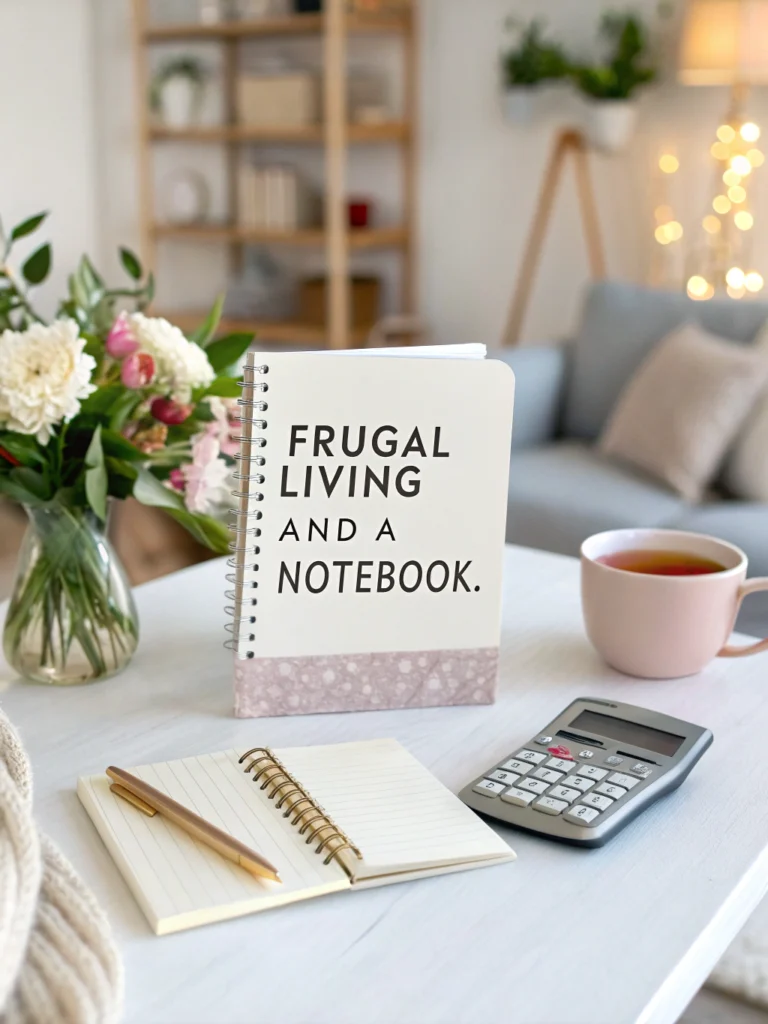Let’s be real, most of us aren’t looking to pinch pennies like we’re auditioning for an extreme couponing show. But if you could save money without dramatically changing your lifestyle? Yeah, that’s the sweet spot. The good news is, you don’t need a finance degree or a spreadsheet obsession to build your savings. You just need a few simple, painless habits that fit into your everyday routine.
Think of it like this: small leaks sink big ships. And those daily $5 lattes? They’re basically drilling holes in your bank account. But before you panic and swear off all joy forever, hear me out. This post isn’t about depriving yourself—it’s about making smarter choices that add up over time. I’m talking real, doable habits that won’t make you feel like you’re living on rice and regret.
No time to read the whole post?
Here’s the quick version: I’m sharing 15 ridiculously simple daily habits that help you save money without feeling like you’re sacrificing everything you love. From meal planning to DIY coffee runs, unsubscribing from temptation emails to negotiating bills—these tricks are practical, easy to implement, and actually work. You’ll also learn how to automate your savings, cut energy costs, embrace secondhand shopping, and stop impulse buying in its tracks. Ready to grow your savings effortlessly? Let’s go.
Table of Contents
Why Daily Habits Matter More Than You Think
Here’s the thing about money: it’s not always the big purchases that wreck your budget. Sure, buying a car or booking a vacation hurts the wallet. But it’s the sneaky daily expenses—the subscription you forgot about, the lunch you grabbed because you didn’t meal prep, the “just browsing” trip that turned into $80 at Target—that drain your account month after month.
When you build smart money habits into your daily routine, saving becomes automatic. You’re not constantly white-knuckling your way through temptation or beating yourself up for overspending. You’re just living your life in a slightly smarter way. And honestly? That’s way more sustainable than any extreme budget makeover.
The beauty of these habits is that they’re low-effort but high-impact. You don’t need to overhaul your entire life—just tweak a few things here and there. Let’s dig into the 15 habits that’ll help you keep more cash in your pocket without making you miserable.
15 Simple Daily Habits to Save Money
1. Make Coffee at Home (Yes, Really)
I know, I know—you’ve heard this one a million times. But stick with me. If you’re spending $5 on coffee every weekday, that’s $100 a month. $1,200 a year. For coffee. I’m not saying you can never treat yourself to a fancy latte again, but making coffee at home most days is one of the easiest ways to how to save money without even trying. Invest in a decent coffee maker or French press, buy some beans you actually enjoy, and boom—you’ve got café-quality coffee for pennies.
2. Plan Your Meals Weekly
Winging your meals sounds spontaneous and fun until you’re ordering takeout for the third time this week because you “don’t have anything to eat.” Meal planning takes like 20 minutes on Sunday, and it saves you from both food waste and impulse restaurant visits. Plus, grocery shopping with a list means you’re less likely to throw random stuff in your cart that you don’t need.
3. Use the 24-Hour Rule for Non-Essential Purchases
Impulse buying is a savings killer. Before you buy anything that’s not a necessity, wait 24 hours. Seriously, just sleep on it. You’d be amazed how often you realize you don’t actually need that thing once the initial “ooh shiny” feeling wears off. This habit alone can save you hundreds every month.
4. Automate Your Savings
Out of sight, out of mind. Set up an automatic transfer from your checking account to your savings account every payday—even if it’s just $20. You won’t miss what you don’t see, and watching that savings balance grow feels pretty damn good. Most banking apps make this super easy, so there’s really no excuse not to do it.
5. Unsubscribe from Retail Emails
Those “flash sale” and “exclusive offer” emails aren’t doing you any favors—they’re designed to make you spend money you weren’t planning to spend. Unsubscribe from your favorite stores’ email lists (yes, even the ones with the cute subject lines). If you really need something, you’ll remember to go look for it. You don’t need daily reminders that there’s a sale on stuff you don’t need.
6. Pack Your Lunch
Eating out for lunch every day is like setting a $10 bill on fire. Daily. Packing your lunch doesn’t have to mean sad desk salads either. Make extra dinner and pack the leftovers, prep a big batch of something tasty on Sunday, or just throw together a sandwich. Your wallet (and probably your waistline) will thank you.
7. Track Your Spending
You can’t fix what you don’t measure. Use a budgeting app, a simple spreadsheet, or even a notebook—just track where your money goes for a month. You’ll probably discover you’re spending way more on certain things than you realized. Once you see the patterns, you can make smarter decisions about where to cut back.
8. Cancel Unused Subscriptions
Take a hard look at your bank statement and identify all those recurring charges. Gym membership you haven’t used since January? Streaming service you forgot you had? Magazine subscription that goes straight to recycling? Cancel them. These “small” monthly fees add up to serious money over a year.
9. Buy Generic Brands
Real talk: most generic or store-brand products are made in the same factories as the name brands. You’re paying extra for packaging and marketing, not quality. Try switching to generic for basics like cleaning supplies, medications, canned goods, and pantry staples. The savings are immediate and you probably won’t even notice a difference.
10. Use Cashback Apps and Browser Extensions
If you’re shopping online without using cashback tools, you’re literally leaving free money on the table. Browser extensions like Honey or Rakuten automatically find coupons and give you cashback on purchases you were already making. It takes zero extra effort and the savings add up faster than you’d think.
11. Embrace Secondhand Shopping
Thrift stores, Facebook Marketplace, Poshmark, eBay—there’s a whole world of gently used stuff out there for a fraction of retail price. Furniture, clothes, books, kitchen gadgets, you name it. Buying secondhand isn’t just budget-friendly; it’s also better for the environment. Win-win 🙂
12. Negotiate Your Bills
Most people don’t realize you can negotiate bills like cable, internet, insurance, and even your phone plan. Call your providers once a year and ask if they have any promotions or discounts available. Companies would rather give you a deal than lose you as a customer. The worst they can say is no, and you might save hundreds annually.
13. Cut Down on Energy Costs
Little changes make a big difference here. Turn off lights when you leave a room, unplug devices you’re not using, adjust your thermostat by a few degrees, use cold water for laundry. These money habits cost you zero effort but can seriously reduce your monthly utility bills. Plus, you’ll feel all eco-conscious and responsible.
14. DIY When Possible
YouTube has tutorials for literally everything. Before you hire someone or buy a new thing, check if you can DIY it. Basic home repairs, haircuts (okay, maybe skip that one unless you’re brave), car maintenance, cleaning products—there are so many things you can do yourself with a little research. You’ll save money and pick up useful skills.
15. Set Specific Savings Goals
Saving “for the future” is vague and not very motivating. But saving for a specific vacation, emergency fund, new laptop, or down payment? That’s concrete and exciting. Set clear goals with actual dollar amounts and deadlines. Track your progress and celebrate milestones. When you have something specific you’re working toward, it’s way easier to stick with your money-saving habits.
Making These Money Habits Stick
Look, I get it—knowing what to do and actually doing it are two different things. The key to making these money habits stick is starting small. Don’t try to implement all 15 at once or you’ll burn out faster than a cheap candle. Pick three that seem easiest or most relevant to your situation and focus on those for a month. Once they feel natural, add a couple more.
Also, cut yourself some slack. You’re going to slip up sometimes. You’ll grab that expensive coffee or impulse-buy something dumb. That’s fine—you’re human. The goal isn’t perfection; it’s progress. Even if you only stick with half these money habits, you’ll still save way more money than you are right now.
Another thing that helps? Make it visible. Put a savings tracker on your fridge, set phone reminders, tell a friend about your goals. When your habits are on your radar, you’re more likely to follow through. And honestly, there’s something really satisfying about checking off a habit or watching your savings account number go up.
The Real Impact of Small Changes
Here’s some quick math to get you motivated. Let’s say you implement just five of these money habits and they save you a modest $10 per day total. That’s $300 a month. $3,600 a year. From small, painless changes. Imagine what you could do with an extra $3,600—emergency fund, vacation, debt payoff, investing, whatever matters to you.
And that’s a conservative estimate. If you really commit to most of these habits, you could easily save double or triple that amount. The compound effect of multiple small habits is seriously powerful. It’s not about one big dramatic sacrifice—it’s about lots of tiny smart choices that add up over time.
The best part? These money habits don’t just help you saving money in the short term. They change your relationship with money entirely. You become more intentional, more aware, more in control. And that confidence and awareness? That’s worth way more than any dollar amount.
Wrapping It Up
So there you have it—15 dead-simple daily habits that’ll help you save money without making you feel like you’re living in a cardboard box eating ramen. You don’t need to be perfect or implement every single one. Just pick a few that resonate with you and give them an honest try for a month. I promise you’ll see results.
The truth is, saving money isn’t really about deprivation—it’s about being smart with your resources so you can spend on the things that actually matter to you. It’s about building security and options for your future self. And honestly? Future you is going to be really grateful that present you got your act together.
Start small, be consistent, and watch your savings grow. You’ve totally got this. Now go forth and make those money habits! 😉
So, which habit are you going to try first? Pick one today and see how much you can save by this time next month. Trust me, you’ll thank yourself later.






